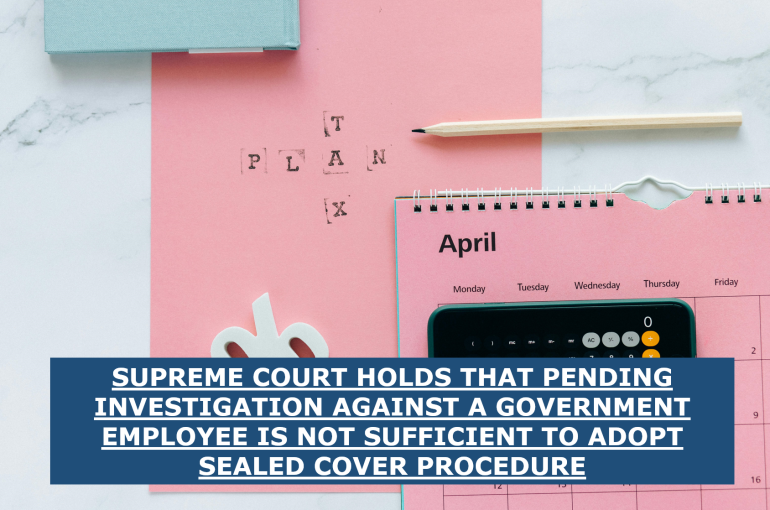SUPREME COURT HOLDS THAT PENDING INVESTIGATION AGAINST A GOVERNMENT EMPLOYEE IS NOT SUFFICIENT TO ADOPT SEALED COVER PROCEDURE
A two Judge Bench of the Hon’ble Supreme Court comprising of Justice Sandeep Mehta and Justice R. Mahadevan passed a judgement dated 24.09.2024 in Union of India and Ors. v. Doly Loyi Civil Appeal No(s). 8387 of 2013 wherein the Hon’ble Court held that sealed cover procedure in cases of promotion could only be invoked after formal charges were filed against the employee.
Facts
The Respondent, Doly Loyi, was appointed as Assistant Commissioner of Income Tax in December 1987. He was subsequently promoted to higher posts, including Deputy Commissioner, Joint Commissioner, and Additional Commissioner of Income Tax. On 31.12.2001, an F.I.R was filed against him under Sections 120B of Indian Penal Code 1860 (IPC) (Criminal Conspiracy) and Sections 13(1) and 13(1)(d) of the Prevention of Corruption Act 1988. (Criminal misconduct by a public servant)
In February 2007, the Departmental Promotion Committee (DPC) held a meeting to consider the promotion of eligible officers, including the Respondent, for the post of Commissioner of Income Tax. Although the Respondent was eligible for a promotion, the DPC withheld the Respondent’s vigilance clearance, and the committee’s recommendations regarding his promotion were sealed under the “sealed cover” procedure, since criminal charges were pending against him.
The Respondent challenged the procedure before the Central Administrative Tribunal (CAT). The Ld. Tribunal directed the Appellants to consider the Respondent for the post and pass a reasoned order within 2 months. The Tribunal held that the Appellants/Authorities must open the sealed cover and grant him promotion with back wages if he was found fit.
The Union of India challenged this decision before the Hon’ble Delhi High Court by filing a Writ Petition bearing no. W.P. (C) No. 7960 of 2012. The Hon’ble Delhi High Court dismissed the Appeal filed by the Appellants and upheld the Ld. Tribunal’s ruling vide Order dated 26.04.2013. Subsequently, the Union of India appealed to the Hon’ble Supreme Court.
Issues
Whether the mere granting of a prosecution sanction, without a formal charge sheet, constituted sufficient grounds for adopting the sealed cover procedure and withholding the Respondent’s promotion?
Arguments by the Counsels before the Supreme Court
The Counsel for the Union of India argued that under the Office Memorandum (OM) of September 1992, Government servants facing criminal prosecution could be subject to the sealed cover procedure. They contended that the FIR lodged against the Respondent and the sanction for prosecution granted by the CBDT were valid grounds to invoke the sealed cover.
The Counsel further argued that the sealed cover procedure was intended to ensure that officials under investigation for criminal misconduct were not promoted while the charges remained unresolved.
On the other hand, the Counsel for the Respondent provided that as on the date of the DPC meeting, no formal criminal charge or charge sheet was filed against the Respondent. He contended that under the rules, the sealed cover procedure could only be invoked after formal charges were issued, which had not happened at the time. The Counsel also emphasized that no departmental proceedings were initiated against the Respondent, and hence, there was no justification for withholding his promotion.
Decision by the Supreme Court
The Hon’ble Supreme Court referred to the ruling in Union of India v. K.V. Jankiraman (1991) 4 SCC 109, which held that the sealed cover procedure could only be adopted after a formal charge sheet or charge memo was issued, not merely on the basis of an ongoing investigation.
The Apex Court reiterated that the pendency of an investigation or the mere granting of a prosecution sanction did not justify resorting to the sealed cover procedure.
In this case, while the sanction for prosecution was granted in June 2006, the Charge Sheet was filed in October 2008 which was well after the DPC held a meeting in February 2007. As such, the Hon’ble Court held that no criminal charge was pending against the Respondent at the time of the DPC meeting. Hence, the Apex Court ruled that the DPC’s decision to use the sealed cover procedure was unjustified, as the essential condition of a pending criminal charge was not met. The Hon’ble Supreme Court also directed that the sealed cover be opened and the Respondent’s promotion be granted, with all consequential benefits.
Conclusion
The Supreme Court dismissed the Appeal of the Union of India and upheld the decisions of the CAT and the Delhi High Court.
The sealed cover was opened in Court, and it was revealed that the Respondent had been assessed as “fit” for promotion. Further, the Court directed that the promotion be given effect and all consequential benefits shall be provided to the Respondent.
The Judgment reaffirmed that the sealed cover procedure in cases of promotion could only be invoked after formal criminal charges were filed. It emphasized that the mere granting of prosecution sanction did not suffice to justify the withholding of promotion. The Apex Court ultimately upheld the promotion of the Respondent and dismissed the Union of India’s appeal.
ARJAV JAIN
ASSOCIATE
THE INDIAN LAWYER & ALLIED SERVICES





































Leave a Reply